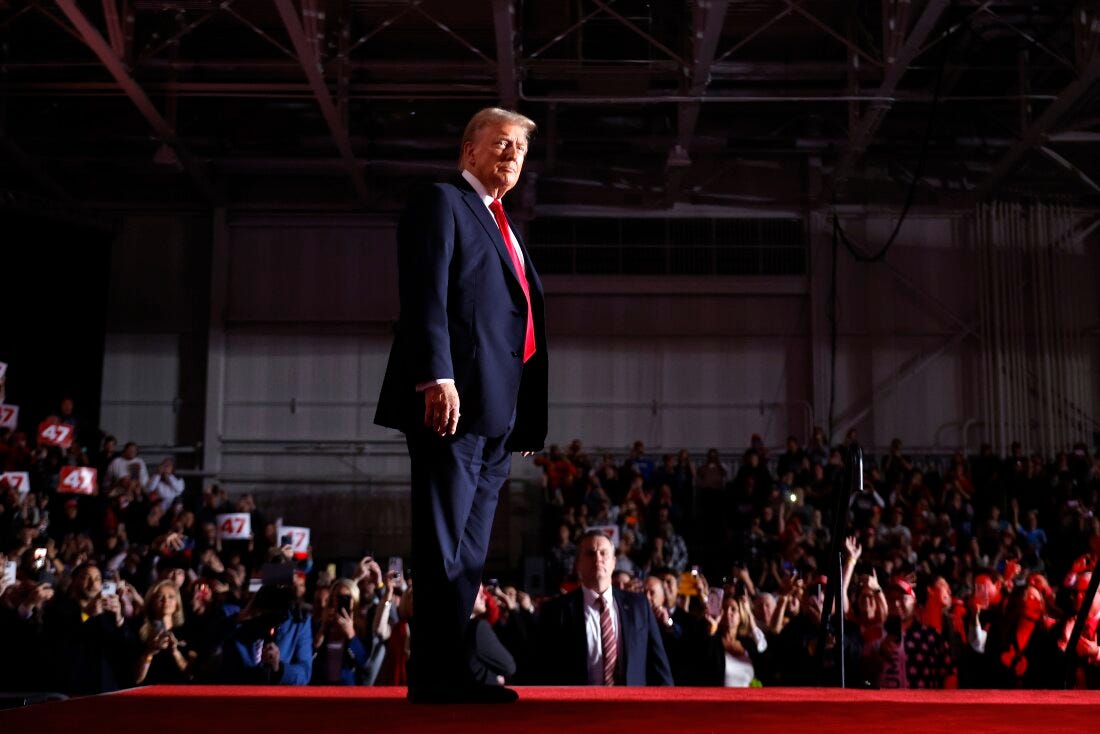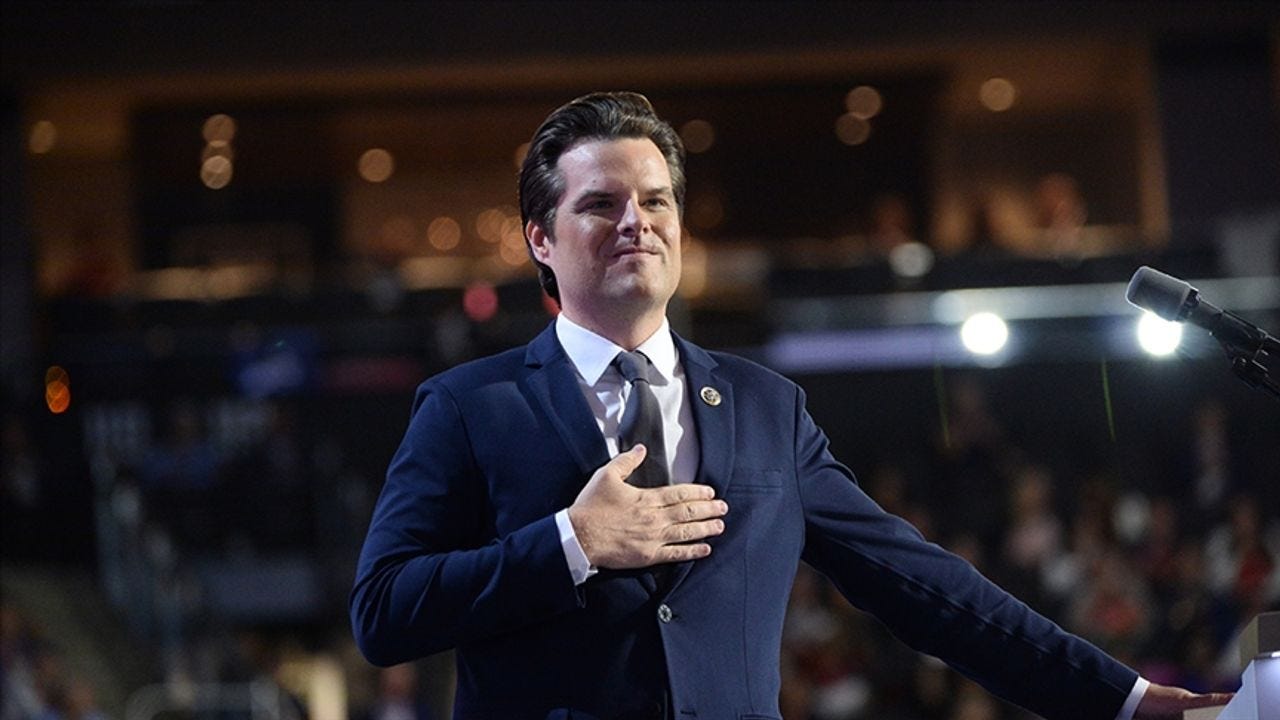The (Likely) Death of Tampa Bay Rays’ Stadium Deal & Trump Picks Pam Bondi as U.S. Attorney General
November 27, 2024 — This Week's Top Stories in Florida
Welcome to this week’s edition of Floridian Today, a newsletter about all things Florida — from politics, business, real estate, and climate. Reporting from the Sunshine State, these are the most important stories you need to know. To never miss an update, subscribe here:
Happy Thanksgiving! 🦃🍽️ 🍂
Here’s the latest from Florida…
Tampa Bay Rays’ New Stadium Deal Nearly Dead
Months after celebrating a deal to keep the Tampa Bay Rays in St. Petersburg with a new $1.3 billion downtown stadium and surrounding 86-acre redevelopment, progress is all but eroded amid mounting challenges. Hurricane Milton’s destruction of Tropicana Field, contentious elections, and disputes between the team and public officials have unraveled the optimism. Last week, ahead of a Pinellas County Commission vote on stadium financing, the Rays announced they could not proceed with the previously agreed-to plan under current terms, citing delays in the approval process that make achieving a 2028 stadium opening date unrealistic. The team also stated the postponement adds significant costs to the construction timeline – costs the baseball club cannot afford. Hours later, commissioners postponed the vote for a second time, rescheduling it for December 17, making the once-celebrated deal even more unlikely to move forward. Two days later, the St. Petersburg City Council also hit pause, delaying a decision on issuing bonds for the city’s $287.5 million share of the stadium and an additional $142 million for infrastructure in the Historic Gas Plant District. The council delayed the vote to January when newly elected members critical of the deal will join. In a subsequent vote, officials also reversed course on repairing Tropicana Field, unanimously disapproving of $23.7 million in spending for a new roof. The $1.3 billion project now faces uncertainty, with the Rays halting work on the stadium and redevelopment. Mayor Ken Welch expressed hope for a revised plan but ruled out additional city funding. Without county or city approval, the deal risks absolute collapse, potentially ending the Rays’ decades-long presence in Tampa Bay.
What’s Next for the Rays?
The biggest question looming over the Tampa Bay Rays is where their future home will be – for the 2026 baseball season and beyond as the original stadium deal is all but doomed. Rays presidents Brian Auld and Matt Silverman have informed local officials that the team can no longer move forward with the agreement under the current terms and halted all work on the $1.3 billion proposal. However, the Rays will need to submit a formal letter to the City of St. Petersburg to officially withdraw from the development agreement. That has not yet happened. The stadium deal's uncertainty extends beyond the ballpark itself, potentially impacting the planned $6.5 billion redevelopment of the surrounding Historic Gas Plant District and the economic boom it was expected to deliver. Affordable housing, office space, hotel rooms, retailers, an African American museum, job opportunities, hundreds of millions in tax revenue, and intentional opportunities to improve economic conditions and social inclusion for St. Petersburg’s Black residents are all up in the air. Some officials worry that without the stadium as an anchor, the redevelopment may not deliver the promised community benefits. Adding to the complexity of the situation, if the city fails to move forward with the ballpark agreement, the team could potentially retain ownership and development rights to the 65 acres of surrounding land. The city, county, and the Rays all seem to favor ending the current deal as structured, but the stakeholders are waiting for the other party to make the first move. As discussions continue to unfold, St. Petersburg officials are exploring options to keep the Rays in their hometown and even the City of Tampa has reentered the fray to keep the team in Tampa Bay. St. Pete Mayor Ken Welch remains optimistic about a path forward for the stalled stadium deal, vowing to push for a solution without additional city funding. MLB Commissioner Rob Manfred has acknowledged the uncertainty but reaffirmed the league's commitment to Tampa Bay fans. While the future of Major League Baseball in the Tampa Bay area remains uncertain, St. Pete officials believe preserving the broader redevelopment vision for the Historic Gas Plant District, even if the Rays walk away, is critical for the community.
Local Officials Give Rays Until December 1 to Clarify Intent on Stadium Deal
Pinellas County Commission Chairperson Kathleen Peters has issued an ultimatum to the Tampa Bay Rays, demanding a clear declaration of their intentions regarding the $1.3 billion stalled stadium deal by December 1. In a two-page letter sent to team presidents Brian Auld and Matt Silverman, Peters requested a written statement confirming whether the Rays plan to proceed with the agreement or terminate it. The move comes after the Rays expressed an inability to move forward under current terms, citing concerns over increased costs due to the likely delays. The team has expressed a readiness “to work on a new solution” for a stadium in Tampa Bay, but Peters criticized these statements as ambiguous, emphasizing the county’s adherence to the agreement and the need for clarity from the team. “If [the Rays] put in writing they want out of the contract, the deal’s dead,” she stated, adding that the county remains committed to its obligations under the agreement.
Trump Names Pam Bondi as New Pick for U.S. Attorney General
President-elect Donald Trump has selected former Florida Attorney General Pam Bondi as his nominee for U.S. attorney general, following the withdrawal of Rep. Matt Gaetz from consideration. Bondi, 59, is a Temple Terrace native and a prominent Florida Republican and staunch supporter of Trump. Bondi served as Florida’s first female attorney general from 2011 to 2019, where she often gained national attention for challenging federal policies, including the Affordable Care Act, and leading efforts against the opioid epidemic. A former Hillsborough County prosecutor, Bondi possesses extensive legal experience and worked on various high-profile cases that launched her career in state politics. She has also frequently appeared as a legal analyst on national news networks. Bondi’s tenure as attorney general was not without controversy. In 2013, her office faced scrutiny for dropping a case against Trump University after receiving a $25,000 campaign donation from Trump’s foundation. Bondi has denied any impropriety. Bondi has remained closely tied to Trump, serving a role in his first impeachment trial, defending him during the 2020 election fraud claims, and managing the pro-Trump Make America Great Again Action super PAC. Bondi’s nomination now moves to the Senate for confirmation. If confirmed, she is expected to enact a series of reforms at the Department of Justice that will restructure the executive department overseeing more than 110,000 employees.
Florida Surgeon General Advises Against Fluoride in Drinking Water
Florida Surgeon General Joseph Ladapo issued guidance Friday advising communities to stop adding fluoride to public drinking water, citing potential health risks. The move aligns with growing skepticism among some conservatives and follows decisions by Collier County and the City of Winter Haven to halt fluoridation. At a press event, Ladapo referred to fluoride in water systems as "public health malpractice," highlighting findings from a U.S. Department of Health National Toxicology Program report. The report links high fluoride exposure, particularly above 1.5 mg/L in foreign countries, to neuropsychiatric risks and lower IQs in children. Ladapo noted that fluoride, while beneficial for dental health, is associated with behavioral and cognitive issues in some cases. He noted that water fluoridation was unnecessary due to its widespread availability in dental products like toothpaste and mouthwash. Approximately 75–80% of Floridians receive fluoridated water, a practice dating back to 1945. While critics argue U.S. water fluoride levels remain safe, proponents stress its role in preventing cavities, especially for low-income families without dental care access. The guidance has sparked debate, with critics arguing that the cited studies reflect conditions in countries where fluoride levels exceed U.S. limits. This move reflects a broader shift in public health approaches and could influence additional Florida municipalities to consider measures eliminating fluoride from public drinking water.
Appeals Court Hears Arguments on Florida’s Ban of Medicaid-Funded Transgender Healthcare
A three-judge panel of the 11th U.S. Circuit Court of Appeals heard arguments last week in a case challenging Florida's restrictions on Medicaid funding for gender-affirming care for transgender residents. The dispute centers on a 2023 ruling by U.S. District Judge Robert Hinkle, who struck down a state law and agency rules prohibiting Medicaid coverage for gender-related treatments. Plaintiffs argued the ban discriminates specifically against transgender individuals, violating federal healthcare laws and constitutional protections like the Equal Protection Clause. The state defended the policy as a rational decision about medical necessity that applies to all residents regardless of gender identity. The case stems from a 2022 rule by Florida's Agency for Health Care Administration deeming gender-affirming treatments "experimental" and not medically necessary. A 2023 law further prohibited Medicaid reimbursements and imposed penalties on providers. The court’s pending decision could significantly impact transgender Floridians’ access to medical care.
Trump Presidency Brings Florida Republicans to National Forefront
Florida’s Republican leaders are taking center stage in Washington, as President-elect Donald Trump fills key federal roles with Sunshine State figures. The appointments reflect Florida’s growing political influence and Trump’s deep ties to the state, his adopted home since 2019. Trump’s picks include Sen. Marco Rubio for Secretary of State, Rep. Michael Waltz as National Security Advisor, and former Florida Attorney General Pam Bondi to lead the U.S. Department of Justice. Susie Wiles, a longtime Florida political strategist, will serve as Trump’s chief of staff, and political insiders from the Sunshine State will fill other key advising and administration positions in the White House. These appointments mark a shift in Florida’s traditionally modest national political role, solidifying its status as an influential Republican stronghold that was quick to coalesce around the populist, anti-establishment sentiment that embodies the incoming president’s style and message. However, Gov. DeSantis gets much of the credit for the state’s conservative transformation, with the shift taking root during the COVID-19 pandemic and the governor’s action to reopen businesses and schools before others. Since then, Florida’s strong economy and brand of advocating for freedom has further bolstered its prominence, leading the nation in net migration for a few years. Trump’s residence and home base at Mar-a-Lago in Palm Beach has allowed the president-elect to foster personal connections with Florida’s Republican leaders, many of whom were early supporters of his presidency. As Florida's conservative agenda influences federal policies and reshapes national politics, the state's moment in the national spotlight heralds a new model of governance where "America is becoming Florida."
DeSantis to Name Rubio’s Replacement in U.S. Senate by January
Florida Governor Ron DeSantis has announced that he plans to name a temporary replacement for U.S. Senator Marco Rubio’s seat by early January. Rubio is expected to resign before Inauguration Day on January 20, 2025, after being nominated by President-elect Donald Trump as U.S. secretary of state. Under Florida law, the governor can make an appointment to fill a vacant seat in the U.S. Senate until the next general election. DeSantis has begun vetting candidates and says his pick will align with Trump’s agenda. Notable names floated for the coveted position include Florida Attorney General Ashley Moody, Lieutenant Governor Jeanette Nuñez, DeSantis’ chief of staff James Uthmeier, former state House Speaker Jose Oliva, and outgoing House Speaker Paul Renner. As Florida’s first Hispanic female lieutenant governor, Nuñez is a particularly compelling choice as her selection would be historic and replace Miami native Rubio with another Miami native. The pick could also enhance DeSantis’ standing among Hispanic voters and boost the GOP’s outreach to minority communities. The President-elect Donald Trump’s daughter-in-law Lara Trump, who serves as Republican National Committee co-chair, has also surfaced as a possible contender. She is backed by several high-profile Trump allies, including Florida’s other U.S. senator, Rick Scott, and has expressed interest in the role, but it is unclear if she is in communication with Gov. DeSantis. The governor emphasized the need for a senator who aligns with the incoming president’s agenda, particularly on immigration and fiscal policies. The U.S. Senate appointee will hold the seat until Florida’s 2026 election, with a chance to run for a full term in 2028.
State Regulators Challenge Dire Insurance Market Warnings
Florida’s Office of Insurance Regulation has issued subpoenas to Weiss Ratings, an independent insurance company rating and financial research firm, requiring the company to provide evidence supporting its warnings about a looming collapse in the state’s homeowners insurance market. Weiss Ratings founder Martin Weiss recently cautioned homeowners about a "high risk" of insurer failures following Hurricanes Helene and Milton. Regulators are requesting emails, texts, and other records to substantiate the claims by the end of November. Weiss, citing First Amendment protections, has not yet decided whether to comply, suggesting that regulators could have requested the information directly instead of issuing subpoenas. Weiss Ratings has criticized Florida insurance practices for upending market stability and previous legislative changes that affect policyholders’ ability to challenge claim denials, arguing they disadvantage Floridians. The rating firm recently reported that three of the state’s largest providers of homeowners insurance denied nearly half of their claims last year without payment, suggesting insurers’ denials of legitimate claims are part of a strategy to preserve their financial stability.
DeSantis Criticizes GOP Senators for Missing Key Judicial Vote
Gov. DeSantis sharply criticized Republican senators who missed a crucial vote last week, leading to the confirmation of Judge Embry Kidd to the 11th Circuit Court of Appeals. Kidd, President Joe Biden’s second appointee to this influential federal court, was confirmed 49-45. DeSantis blamed the absence of six Republican senators, including JD Vance of Ohio and Marco Rubio of Florida, for allowing the "leftist judge" a lifetime appointment. “This seat could have been filled by Donald Trump next year had Republicans showed up,” DeSantis wrote on X. While both Vance and Rubio are set to join Trump’s administration in January, they remain eligible to vote until they resign their seats. Former President Trump also voiced frustration, urging Republicans to block further judicial confirmations before Inauguration Day.
Former Rep. Matt Gaetz Declines Return to Congress
Former U.S. Rep. Matt Gaetz announced he will not seek to reclaim his old congressional seat after resigning following his nomination to U.S. attorney general by President-elect Donald Trump. Nearly one week after being named to lead the Department of Justice in the next presidential administration, Gaetz withdrew his name from consideration, citing growing confirmation challenges tied to ethical concerns and unresolved allegations of misconduct, which he denies. In announcing the decision, the polarizing Republican opted instead to pursue other avenues of political involvement. The move shapes the political landscape for Florida’s 1st Congressional District ahead of a competitive primary scheduled for January 28. Republican state representatives Michelle Salzman and Joel Rudman have already declared their intentions to run for the vacant seat, with Florida Chief Financial Officer Jimmy Patronis also announcing his candidacy and securing Trump’s coveted endorsement. The special election for the deeply red Panhandle congressional district is scheduled for April 1.
Trump Backs Randy Fine for Florida's 6th Congressional District Seat
President-elect Donald Trump has endorsed newly-elected state Sen. Randy Fine (R-Melbourne) for Florida's 6th Congressional District seat, which will be vacated by U.S. Rep. Michael Waltz after being tapped to serve as Trump’s national security adviser. Fine, an outspoken Republican previously served in the Florida House for eight years before his election to the state Senate earlier this month. He will resign his current seat representing Brevard County effective March 31, 2025, nearly halfway through the state’s 2025 legislative session. Fine was a vocal supporter of Trump from the outset of the GOP presidential primary and has openly expressed his loyalty to Trump on social media platforms. Florida's 6th District includes northern Volusia County, Flagler, Putnam, and parts of St. Johns, Marion, and Lake counties. Gov. Ron DeSantis is expected to call a special election to fill the seat.
St. Petersburg’s First Car Condo Development Nearly Sold Out
Motocave, St. Petersburg's premier "car condo community," is nearly sold out, with just seven of its 43 units remaining. Located on 3.75 acres at the northeast corner of Interstate 275 and Gandy Boulevard, the innovative development offers car enthusiasts secure, fully customizable spaces for vehicle storage and leisure. Each 22-foot-tall condo unit ranges from 900 to 2,200 square feet and can be personalized to owner preferences, with many adding mezzanine lounges above their vehicle storage areas. Motocave also features a 2,200-square-foot community clubhouse with amenities like a bar, showers, and a vehicle detailing bay. The developer highlighted the project's appeal to out-of-state buyers seeking secure vehicle storage, particularly during harsh winters. The facility's 11-foot elevation and storm resilience during recent hurricanes have also proven attractive to affluent homeowners near the beach seeking to protect their collectible cars or recreational vehicles.
Tim Hortons to Return to Florida After 30-Year Absence
Canadian coffee chain Tim Hortons is set to make a return to Florida after more than 30 years. Preliminary plans indicate its first new location will open in Ellenton, a Gulf Coast suburb near Bradenton, known for its large outlet mall along Interstate 75. According to documents filed in Manatee County, the proposed site is a 1,700-square-foot building across from the Acapulco Tropical y Mas plaza. Tim Hortons, famous for coffee, doughnuts, and signature Timbits, also offers sandwiches and other menu items. The popular chain has over 5,300 locations worldwide, with about 600 in the U.S. Tim Hortons had locations in Broward County, Florida, until the early 1990s.
Thanks for reading this edition of Floridian Today. To never miss an update, subscribe for free:
In the meantime, if you learned something or found this read interesting, please consider sharing it to grow our community!











